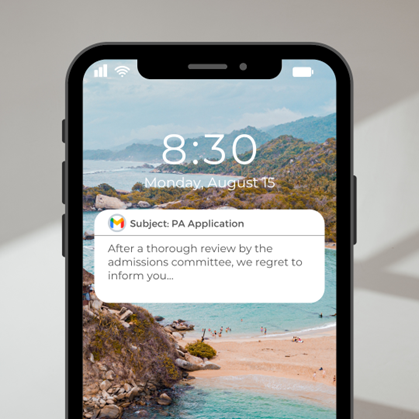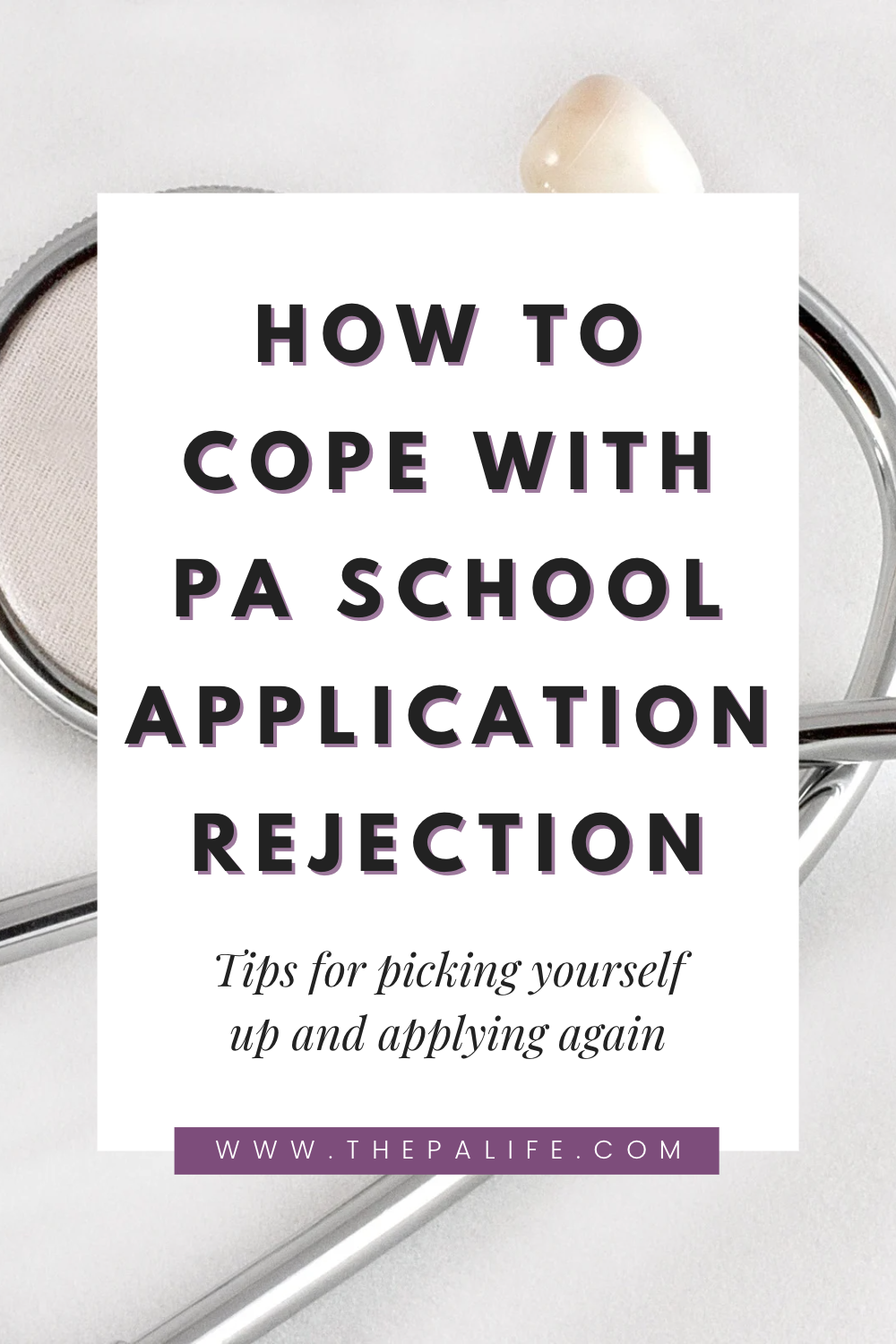If you want the rainbow, you have to make it through the rain.

Statistically speaking, most applicants will face rejection at some point in their application process (take it from me, I know).
According to the 2020-2021 PAEA analysis of matriculant and applicant data, 30,353 applications were submitted, with 11,235 applicants matriculating into a program.
This amounts to an acceptance rate of 37%, a disheartening figure at best.
As a pre-PA, my fear of rejection had a death grip strength and suffocating presence.
It was its own beast, likened to a clingy pet I could not avoid.
When asked where I wanted to go to school, I reflexively followed my response with, ".. but it’s a really selective school. Most people don’t get in on their first try. "
I was subconsciously attempting to safeguard myself from the anticipated embarrassment if I "failed." I relentlessly tried to convince myself that it would be okay if I didn’t get in, that I wouldn’t be eternally doomed to mediocrity.
As much as I’d love to justify my angst by believing these worries propelled me to do the things that led to my acceptance, we can unanimously agree that I would have done all of those things anyway, just with significantly less stress.
Once I finally hit "submit" and sent the organized list of everything that consumed my young-adult life, I was shocked to realize that my fear of rejection had miraculously gotten worse.
Now there was a tangible document that could be rejected. Before, it was just a goal; no one saw my GPA, analyzed my extracurriculars, or met me in an interview.
Now, they had a physical document on which they could declare their final judgment and deem me "not good enough."
Recommended Reading:
Not good enough
The interview was on my birthday. I could have done without the extreme sympathetic nervous system activation to ring in 22, but alas, I packed my car and drove across a few states to interview in person (even worse, I know).
At the time, I had previously been accepted to another program that I really loved; it checked most of my boxes, and I knew that I would almost certainly go there regardless of the outcome of this interview. However, I was encouraged to do another interview and keep an open mind.
I didn’t feel as much pressure as in my initial interview; in fact, I felt even more confident and prepared for this interview (that aged well). Leaving the interview, I felt fine. I didn’t think I blew it out of the water, but I didn’t think it was terrible.
It's my party, and I'll cry if I want to
Be thankful for the struggles you go through. They make you stronger, wiser and humble. Don't let them break you. Let them make you. - Anonymous

Fast forward two weeks, and I’ve arrived at my destination for a long-awaited weekend getaway. On a gorgeous beach, without a care in the world, I received my first rejection email—from none other than the “birthday interview” school.
Not only was I rejected, but I didn’t even make it on the waitlist; it was a double whammy, a roundhouse kick to the gut. I was devastated, although I couldn’t explain why.
"You didn’t even want to go there…right?", "you already got in somewhere else" and "someone else would be thankful to be in your position" are only a few intrusive thoughts that immediately attempted to bandage my injured ego.
For weeks, I sulked over this rejection, ruminating on the new, muddled perception I had of the interview; now, naturally, imagining it as the worst human interaction in history.
"Maybe I was too relaxed," I reasoned. "Why didn’t you ask this question?" and "You sounded shrill. Lower your voice and maybe they will have considered you," are a few examples of the self-deprecating words that rang through my head incessantly.
I had no explanation for the rejection, and I never would, a fact about which I was both in complete denial and borderline hysteria.
Seeking Reassurance
"Reassurance is futile because we can never have enough of it." Seth Godin
I took being rejected personally. I blamed it on myself, my personality, and my presence in the interview. I suddenly looked at my application, credentials, and all my hard work as “not enough.”
It didn’t matter that I had already gotten in somewhere else; now, all I wanted was approval from the three interviewers who made me feel so defeated.
I was terrified of having to tell people I didn't get in, fearful that this would be the start of an endless string of rejections. It made me resent the school I had been accepted to, thinking it wasn’t "as good" because they chose to accept me. All of this for an interview I almost turned down.
The worst of it—having to pick myself up out of my shame spiral to keep interviewing. I wanted to throw in the towel and never risk feeling like this again.
As luck would have it, a few days after my rejection, I was offered an interview at my top choice program. On the one hand, I was excited and grateful; this was the program I had been aiming for since the beginning. On the other hand, I was paranoid that the amount of weight this school held in my mind would make the rejection all the more painful.
I came up with every reason to turn down the interview, and for a serious moment, I considered it. After an intense bout of moping, I eventually came to the rational conclusion that I could not let one hit to my ego curtail my entire application process.
You Got This

The first form of suffering is the anxiety of experiencing failure in advance. The tortured twisting and self recrimination, judging ourselves for things we haven't even done yet. - Seth Godin
I spent the next month essentially digging myself out of a mental grave to resurrect some semblance of self-confidence for my next interview.
So much of our success in an interview is attributed to self-perception, and I had a lot of rethinking to do. One of the most important changes I made was understanding that rejection is not personal (!!!).
This was a hard pill to swallow, especially following constant internal dialogue of reasons why my rejection felt personal, but realistically, there are countless extraneous factors that are completely out of our control.
A great way to put this into perspective is to consider the numbers; the average PA school has a matriculation rate of approximately 6% (i.e., 6% of the people who apply will end up in the program). Can you honestly say that you believe 94% of applicants were personally singled out and rejected because of some sort of major character flaw?
No, absolutely not.
As much as we want to be noticed by these programs, the reality is that even until we get through an interview, we are still just an applicant, a number, if you will. If we put the amount of thought into a rejection that a school puts into rejecting us, we wouldn’t even have time to be upset.
In many ways, admissions to any school are just a big numbers game. So much more than we realize is random, arbitrary, and probably even a little unfair, but this is more of a reason to understand that a rejection is not something to take personally.
Grow Up
When success doesn't occur, the easiest thing is to walk away and not make the mistake of speaking up ever again. The most important thing to do, though, is to do it again, to care again and to seek to make change, again. - Seth Godin

There will always be things we want to improve or wish we had done differently after an interview, but don’t let rejection cloud your judgment.
Limit reflection to immediately after the interview when the encounter is fresh in your mind. Take time over the next few days to think about what you wish you did differently, implement those changes, and then never think about it again.
Being rejected can spark a slew of new insecurities that are simply figments of our imagination, initiated by feeling like we must have done something truly terrible to be deemed “unworthy” of a spot (rest assured, it would not take several weeks and a rejection email for us to realize we did something truly terrible).
If, at first, you don't succeed...
“By embracing imperfection, by having the courage to be rubbish, we can begin. And once we begin, we become a little less rubbish, and then a little less. And eventually, out of the rubbish come exceptional, effortless breakthroughs in the things that matter.” - Greg McKeown
Fast forward a month, and I’m back in the interview hot seat, shoving the self-doubt as deep as possible. No one in that interview knew I had been turned down by another PA program, and I was adamant about appearing as such.
I prepared more intentionally, worked diligently to improve how I thought about myself and my capabilities, and built a stronger sense of self-confidence that has made me comfortable enough with rejection to be able to talk about it without feeling debilitating shame or embarrassment.
I left the interview feeling like it was the best yet, and for the first time possibly ever, I was more proud of myself than worried about the outcome. I placed a little less value on what the admissions committee thought about me and more value on how I felt about myself—very cliche, but a serious victory.
Rejection
If the only cost of being rejected is the experience of being rejected, it's a foolish compromize to err on the side of doing only the things that are guaranteed to work. - Seth Godin
No risks equals no failure. And a lack of failure will teach you nothing and likely lead to a lifetime of regrets.
Rejection is always hard. It doesn’t matter who it is, how many programs you’ve already been accepted to, or how long you grapple with what went "wrong." None of us ever want to feel like less than enough.
With that said, rejection does not have to derail your entire professional plan. Persistence through rejection will lead to opportunities you would never have experienced had you not been forced to push through the most difficult times.
In divine timing, another rejection strolled into my inbox as I am wrapping up this post. I’ve been committed to a program for several months, but still, for a moment, it stung.
Except this time around, it stung for a fleeting minute, and self-deprecating thoughts were M.I.A.
What one admissions committee doesn’t see in you, several others will. Be resilient and persistent, and find comfort in knowing that not even your birthday can protect you from rejection.
Action Steps:
1. Develop a Resilient Mindset: Understand that rejection is a part of the process and not a personal attack on your abilities or character. Much of the success in an interview and the admissions process comes down to self-perception. It's essential to believe in your capabilities and maintain a positive outlook, even in the face of rejection. Remember, the matriculation rate is low, and many factors in the admissions process are out of your control. So, don't let rejection affect your self-esteem or deter you from pursuing your goal of becoming a physician assistant.
2. Reflect and Improve: After each interview, take time to reflect on your performance while the encounter is still fresh in your mind. Identify any areas where you could improve or things you wish you had done differently. Implement these changes in your future interviews. However, once you have taken these steps, it's important to move on and not dwell on past interviews. Focusing too much on past rejections can cloud your judgment and negatively affect future performance.
3. Prepare and Persist: Prepare thoroughly for each interview, keeping in mind your self-reflection and the changes you have decided to implement. Remember that each interview is a new opportunity, and past rejections are not indicative of your future performance. Maintain a strong sense of self-confidence and try not to place too much emphasis on what the admissions committee thinks of you. Instead, focus on how you feel about yourself and your abilities. Persistence is key in this process. Even if you face rejection, keep applying and pushing through the difficult times. This persistence could open up opportunities that you may not have had otherwise.
Recommended reading:
View all posts in this series
- My PA School Interview: The Journey of a Lifetime
- The Top 46 Physician Assistant Applicant Interview Questions
- Use this Interview Hack to Get The Physician Assistant Job of Your Dreams!
- The Physician Assistant Job or PA School Interview – Email Etiquette
- The Physician Assistant Interview: Thank You and Follow-up (With Sample)
- A Look Inside Two PA School Interviews
- 5 Things I’ve Learned Going Into My Fourth Physician Assistant Application Cycle
- 300 PA School Interview Questions You Should Be Ready to Answer
- PA School Mock Interviews: Prepare with a LIVE, Recorded Video Interview
- Mock Physician Assistant School Interview With Taylor Hill Pre-PA
- Mock PA School Interview With Pre-PA Lily Boyle
- The Interview That Got This Pre-PA Into 5 PA Schools
- 101 PA School Applicants Answer: What’s Your Greatest Strength?
- Mastering Your PA School Interview: Tone Matters
- The Worst PA School Interview Question Ever!
- Why Choose PA Over NP? Here’s the Perfect Answer
- Don’t Make This Critical PA School Interview Mistake!
- 5 Best Ways to Give a Memorable PA School Interview
- 3 Things to Do the Night Before Your PA School Interview
- How to Prepare for Your PA School Interview Day Essay
- How to Squash PA School Interview Day Stress (4 Simple Steps)
- Mind Mapping: A Tool for Personal Statements, Supplemental Essays, and Interviews
- Here’s What a REAL PA School Interview Looks Like (in 2024)
- My PA School Interview Preparation Strategy
- How to Bring Your Best on PA School Interview Day
- How to Cope with PA School Application Rejection
- ChatGPT Answers the Top 46 PA School Applicant Interview Questions
- Why Our Program? How to Answer This Common Supplemental Essay and Interview Question
- What is a PA? How to Nail This Not-So-Easy Interview Question
- How to Answer Behavioral Questions in Your PA School Interview
You may also like -
















Leave a Reply